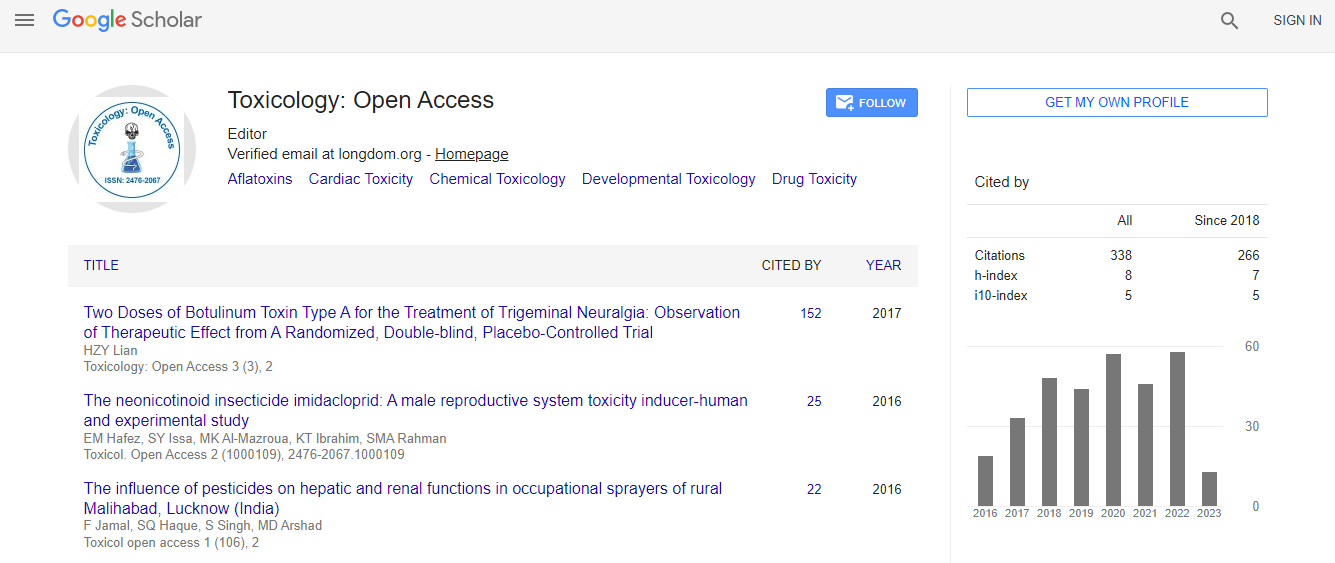Our Group organises 3000+ Global Conferenceseries Events every year across USA, Europe & Asia with support from 1000 more scientific Societies and Publishes 700+ Open Access Journals which contains over 50000 eminent personalities, reputed scientists as editorial board members.
Open Access Journals gaining more Readers and Citations
700 Journals and 15,000,000 Readers Each Journal is getting 25,000+ Readers
Google Scholar citation report
Citations : 336
Toxicology: Open Access received 336 citations as per Google Scholar report
Indexed In
- Google Scholar
- RefSeek
- Hamdard University
- EBSCO A-Z
- Geneva Foundation for Medical Education and Research
- Euro Pub
- ICMJE
Useful Links
Related Subjects
Share This Page
In vivo characterization of the biochemical and histological changes induced by the stonefish (Synanceia verrucosa) venom in rats
14th World Congress on Toxicology and Pharmacology
Ahmad M Khalil, Mohammad A Wahsha, Khalid M Abu Khadra, Maroof A Khalaf and Tariq H Al-Najjar
Yarmouk University, Jordan University of Jordan, Jordan
ScientificTracks Abstracts: Toxicol Open Access
Abstract
Statement of the Problem: The stonefish (Synanceia verrucosa) is one of the most dangerous venomous fishes ever known. Stonefish venom may be life-threatening to humans, envenomation can be quite hazardous, provoking extreme pain and imposing significant socioeconomic costs, as the victims may require days to weeks to recover from their injuries. Very little research has been undertaken on marine creatures, particularly venomous fish. The purpose of this study is to evaluate the toxicity of the stonefish (S. verrucosa) venom as well as biochemical and histological changes in a rat model. Methodology: Fish samples were collected by SCUBA diving from the northern sites of the Red Sea (Gulf of Aqaba/Jordan). The crude venom was extracted from the spines and biochemical and histopathological changes induced by intramuscular injection of the sub lethal dose of the venom of were examined in Sprague-Dawley rats. Findings: The 24h LD50 of the venom was estimated to be 38 �¼g venom/kg body weight. The levels of the serum biochemical markers; alanine transaminase, lactate dehydrogenase and creatine kinase increased 6 hours after administration and remained significantly high till 24 hours. Envenomed animals exhibited symptoms like convulsions, muscular dis-coordination and paralysis, urination and respiratory failure. Envenomation caused massive damage to liver tissues. Similarly, extended treatment of rats was manifested as interstitial hemorrhage and widening of kidney tubules. Furthermore, the venom caused neuropathological alterations such as spongiosis of brain tissue and had myotoxic effect on cardiac tissues. Conclusion & Significance: The S. verrucosa venom contains edema-causing factors and is hepatotoxic, nephrotoxic, myotoxic and neurotoxic to the test rat model. The findings may encourage the health care industry to develop an indigenous anti-venom related valuable pharmaceutical product. References 1. Han H, Baumann K, Casewell N R, Ali S A, Dobson J, Koludarov I, Debono J, Cutmore S C, Rajapakse N W, Jackson T N W, Jones R, Hodgson W C, Fry B G, Kuruppu S (2017) The cardiovascular and neurotoxic effects of the venoms of six bony and cartilaginous fish species. Yanagihara AA, ed. Toxins; 9(2): 67. 2. Subramaniyan A, Saravanamurugan R, Sangeetha P (2016) Haematological and biochemical changes in lionfish (Pterois russelii) venom treated Swiss albino mice. International Journal of Pharma and Bio Sciences; 7(1): (B) 83-88. 3. Saravanamurugan R, Subramaniyan A (2015) Neuromuscular modulatory activity of lion fish Pterois russelii venom in mice. Life Science Archives (LSA); 1(4): 233-239. 4. Maghamiour N, Naser Safaie N (2014) High creatine kinase (CK)-MB and lactate dehydrogenase in the absence of myocardial injury or infarction: A case report. Journal of Cardiovascular and Thoracic Research; 6(1): 69-70. 5. Gomes H L, Andrich F, Fortes-Dias C L, Perales J, Teixeira-Ferreira A, Vassallo D V, Cruz J S, Figueiredo S G (2013) Molecular and biochemical characterization of a cytolysin from the Scorpaena plumieri (scorpionfish) venom: evidence of pore formation on erythrocyte cell membrane. Toxicon; 74: 92-100.Biography
Ahmad M Khalil has received his PhD in Cytogenetics from The Ohio State University, USA in 1987. He chaired the Department of Biological Sciences at Yarmouk University, Jordan (2001-2003). He has founded Biotechnology MSc Program in 2003. In Arabic, he authored a book in radiation biology, a unit in molecular biology, a chapter in genetics. He has written 35 single-authored scientific articles of general interest. He has published 45 research papers in peer-reviewed international journals. He has received several awards and fellowships and is active Reviewer and Member in Editorial Board of several local, regional and international journals.
Email:kahmad76@yahoo.com

 Spanish
Spanish  Chinese
Chinese  Russian
Russian  German
German  French
French  Japanese
Japanese  Portuguese
Portuguese  Hindi
Hindi 